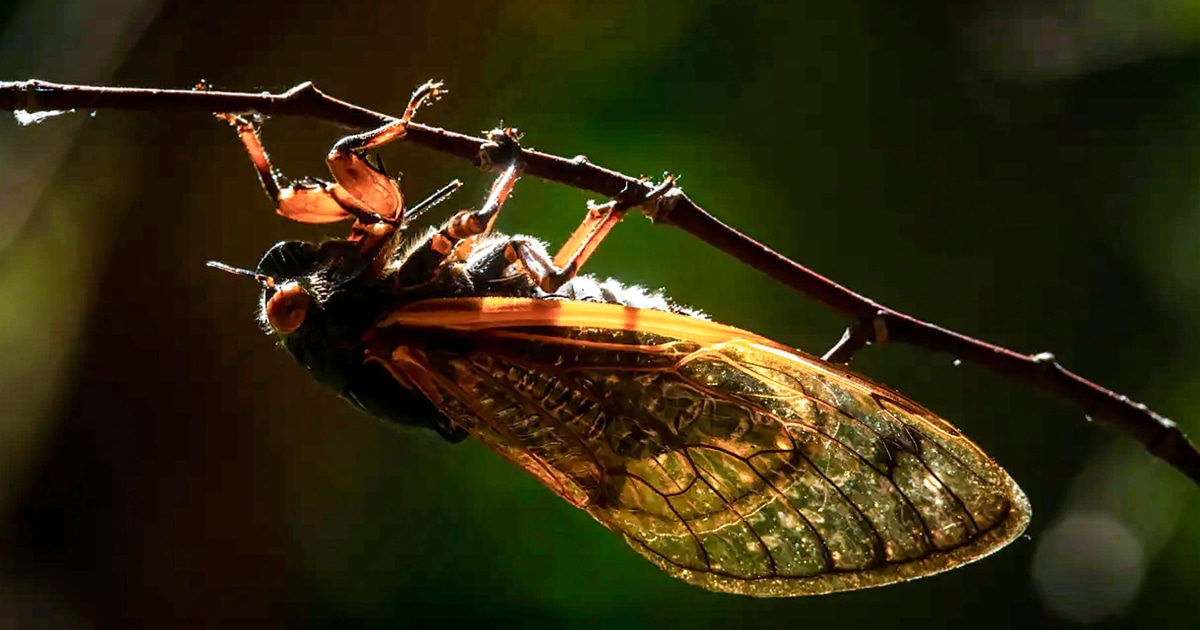After living underground for 17 years, billions of periodical cicadas - a type of flying cicada - are preparing to emerge to the surface in the United States.
The insects come out when they are adults in order to mate.
To attract a female, male cicadas emit a deafening call that can reach 90 decibels - a similar volume to a powerful engine.
The phenomenon, expected to begin at the end of the week, will be particularly noticeable on the east coast of the US, from Tennessee to New York.
These periodical cicadas belong to Brood X, also known as “the Great Eastern Brood,” which is one of 15 broods of periodical cicadas that appear in the eastern USA.
Only male cicadas make the loud-pitched mating call, which is produced by the vibrations of a drum-like organ called a tymbal.
After eating and growing underground for 17 years, the chorus of billions of cicadas singing in unison is set to transform the soundscape of parks and gardens in the US.
Soon, expect to see & hear massive numbers of Brood X cicadas as they complete their 17-year life cycle.
Once above ground, they'll shed their outer skin, make a lot of noise, mate, lay eggs & die;
leaving behind the next generation & wispy piles of crunchy, discarded skin.🪲 pic.twitter.com/I1XXbnIkvN
- National Mall NPS (@NationalMallNPS) May 5, 2021
"The invasion is coming. This spring, billions of cicadas are going to emerge from the ground, ”the National Mall, the caretakers of important monuments and parks in Washington, warns in a Twitter post. The US Environmental Protection Agency (EPA) has also launched a social media campaign to stop citizens from fumigating the cicadas, given that pesticides could affect other species. “Cicadas are harmless. They are a valuable food source for other animals. Ignore them. They won't be here forever, ”the EPA maintains. Periodical cicadas, which do not bite or sting humans, typically only live one month on the surface.
The long time it takes periodical cicadas to reach maturity and the exactitude with which the insect rises to the surface every 17 years are a source of great interest to scientists.
According to Daniel Gruner, associate professor of Entomology at Maryland University, studies have shown that the cicada is able to measure time thanks to tree roots - the movement of fluid to the root slows down in winter and speeds up during the growth period.
"However, we don't know how they are able to keep count of one year after another" until 17 years have passed, says Gruner.
He adds that the timing is not always exact, as there are some cicada nymphs that come out earlier.
A group of cicadas in Chevy Chase, Maryland.
ANDREW CABALLERO-REYNOLDS / AFP
Gruner says there is no reason to use pesticides against the insect as "they are not a plague, they don't bite, they don't sting, nor do they spread disease or damage crops or property." The expert adds that taking such action will only increase the health risk to humans and other animals. Entomologist John Cooley from Connecticut University argues that instead of fearing the emergence of the periodical cicada, people should welcome it as an opportunity to learn more about the environment. “We can learn more about our forests; understanding how they work is key to living with them sustainably, ”he explains.
Although the mass emergence has not yet begun, it is not uncommon now to find cicada shells outside of homes or hear them crunch when they are accidentally stepped on by passers-by in Washington. The two factors that are key to their emergence are humidity and warm temperatures - ideally, the soil should be 18ºC. “We have had a cold snap and this appears to have slowed down the process a lot,” says Cooley, who expects the insects will rise definitively to the surface next week.
Periodical cicadas spend most of their lives underground eating tree rootlets, before tunneling to the surface.
Once outside, typically in green areas, the insect heads en masse toward trees.
The female lays between 400 and 600 eggs on small branches, which she punctures to lay the eggs inside.
The emergence of the cicada will be a feast for spiders and other predators, such as rats, birds and snakes.
Those who have eaten cicadas say the insect tastes like tofu.
There are several species of periodical cicadas and each has different life cycles and population sizes.
Brood X has the longest life span and emerges in some of the largest numbers.
Entomologist Michael Raupp with a cicada at Maryland University CARLOS BARRIA / Reuters
The event usually lasts for approximately 40 days. Given that the mating call can reach 90 decibels, the insect's presence is likely to cause some disruption to daily life. Affected residents will be exposed to noises as loud (and bothersome) as those on a construction site. According to the Centers for Disease Control and Prevention (CDC), being exposed to the sound of a motorbike for 50 minutes can damage hearing. Many citizens are deciding to stay indoors for the phenomenon. But given the recent coronavirus restrictions on movement, the desire to go outside may outweigh the desire to avoid the cicada's noisy mating song.
The periodical cicada dies after a month on the surface.
If the male's call is successful, the insect will have found a female and mated with her, and she will have laid an enormous number of eggs on tree branches.
At the end of summer or the beginning of autumn, the new generation of cicadas will then head underground, where they will live off tree rootlets until they mature into adults.
With the emergence fast approaching, Grunen says: "We must enjoy this event for the astonishing natural spectacle that it is, before [the periodical cicadas] return to hiding for another 17 years."
Spanish version by
Melissa Kitson
.





